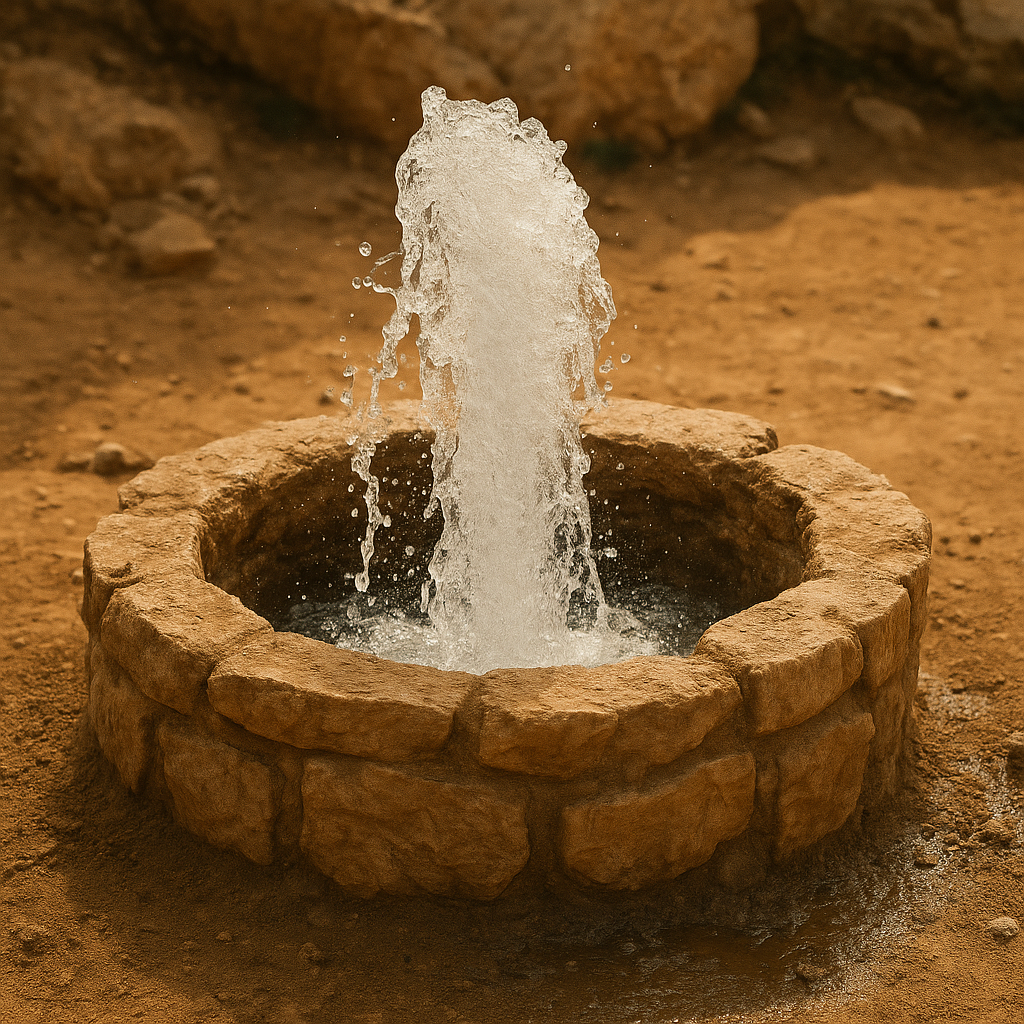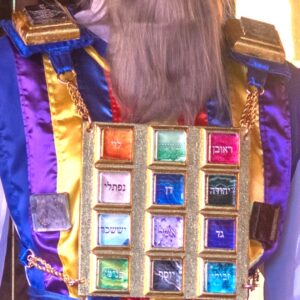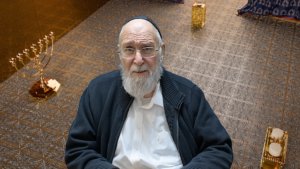Redigging The Wells
Yitzchak’s Unique Mission: Holiness That Cannot Leave the Land
In Parshat Toldot Yitzchak faces a famine – the same test Avraham had endured a generation earlier. Naturally, Yitzchak assumed he should follow his father’s example and go down to Egypt. But Hashem intervenes directly: “Do not descend to Egypt.” Yitzchak is an olah temimah – fully consecrated, like a korban placed upon the altar. Having been bound on the Mizbeach at the Akeidah, he carries a level of sanctity that cannot be exposed to the spiritual contamination of the Diaspora.
Hashem therefore commands: “Gur ba’aretz – dwell in this land.” Stay within the Holy Land, even if conditions are difficult, even if the famine is strong, even if survival seems easier elsewhere.
Why Yitzchak Was Sent Specifically to the Land of the Plishtim
Yitzchak follows Hashem’s command and travels to Eretz Plishtim, the region historically associated with what is today called Gaza. Although this region lies within the biblical borders of Eretz Yisrael, the Torah describes it with nuance – it is part of the Land, yet spiritually a lesser degree of holiness.
Rashi (26:12) highlights this tension. When the Torah says, “Yitzchak sowed in that land and found in that year one hundred measures,” Rashi explains:
Ba’aretz hahi – even though it was not as important as Eretz Yisrael itself.
How can it simultaneously be inside the Holy Land and yet not fully equal to it?
The answer lies in the identity of the Plishtim. They were not among the seven Canaanite nations destined for destruction. They were not completely depraved, nor were they granted the full spiritual elevation of the covenantal Land. They existed in an in-between zone – physically within the borders of the Land, spiritually of a different nature.
This intermediate status explains why Yitzchak is allowed to reside there. It is Eretz Yisrael – but Eretz Yisrael on a lower rung.
The Meaning Behind Yitzchak’s Descent to a Lower Level
Yitzchak remains entirely within Hashem’s command. He does not leave the Land, yet he descends to a region with reduced holiness and diminished spiritual clarity. This becomes essential for understanding the deeper theme of Toldot: Yitzchak’s avodah is not to escape downward movement, but to transform it.
Where Avraham’s holiness manifests as outward expansion—movement, conquest, journeys—Yitzchak’s greatness is inward. His greatness is digging, purifying, redigging old wells, and uncovering buried holiness.
His first step into this mission begins right here: inhabiting a part of Eretz Yisrael that requires elevation, illumination, and spiritual reclamation.
Yitzchak’s Rising Wealth and the Envy of the Plishtim
As the famine subsides, Yitzchak remains in Gerar under the rule of Avimelech. After the initial tension – Avimelech discovering that Rivka is Yitzchak’s wife – Avimelech grants them protection and allows them to stay in the region. What follows is an unprecedented blessing. Yitzchak’s fields yield one hundredfold, and his livestock multiplies beyond measure.
So extraordinary was his prosperity that the Midrash records a striking expression:
“Better the dung of Yitzchak’s animals than the gold of Avimelech.”
Even the waste of Yitzchak’s livestock brought blessings to those who acquired it. The Plishtim saw this, grew jealous, and ultimately expelled him from Gerar. But before leaving, Yitzchak carries out a mysterious act that the Torah emphasizes at length: he redigs the wells originally dug by Avraham Avinu.
Why the Torah Highlights the Digging of Wells
The Philistines had deliberately clogged Avraham’s wells. On the surface, they offered a strategic explanation – to deprive enemy soldiers of water. Yet the Torah’s repetition and detail indicate a deeper meaning.
Yitzchak, before departing Gerar, reopens every sealed well, restoring the flow of living water. Each time he finds a new source, the Plishtim quarreled, claiming ownership. Yitzchak moves on, digs again, and only after repeated attempts does he finally arrive at a well over which there is no dispute.
The Torah dedicates significant space to these episodes because they embody Yitzchak’s spiritual mission: uncovering buried holiness, restoring what the forces of negativity attempt to block. The wells are symbolic vessels – channels through which divine blessing flows into the world.
Reb Noson: Philistines Represent “Mefulash” – Light Without Vessels
Reb Noson uncovers the deeper spiritual identity of the Plishtim. Their name shares a root with mefulash – an open alleyway with no walls, no boundaries, no structure. In the laws of Eruvin, a mavuy mefulash is unbounded and therefore invalid; it lacks the partitions necessary for sanctified movement.
This describes not only a place, but a mentality. Reb Noson writes:
Plishtim represent an attitude of wanting spiritual light without the vessels required to contain it.
These are people who push for religious or mystical experiences without limitation, without grounding, without struggle, without the healthy resistance that forms character and spiritual maturity. They want inspiration without effort, revelation without responsibility, ascent without inner work.
Rebbe Nachman teaches in Likutey Moharan 24 that this is impossible.
Light without vessels leads to collapse.
Elevation without boundaries leads to burnout.
A person who ascends too quickly, without the stabilizing force of obstacles and setbacks, inevitably crashes.
Judaism does not demand extremes. Deracheha darchei noam – the Torah’s ways are pleasant
The Purpose of Setbacks – Building the Vessels of Light
Rebbe Nachman introduces a core spiritual principle:
The very obstacles that seem to push a person away are Heaven’s way of helping him build the vessels to receive true light.
It is the delays, frustrations, confusions, and closed doors that shape a person into someone capable of holding spiritual energy without self-destruction. What feels like rejection is actually construction.
By contrast, the Plishtim—the mefulash mindset—seek:
- unbounded spiritual highs
- intensity without preparation
- openness without structure
- experiences without vessels
Reb Noson warns: these are the people who fall the hardest. Their light is too great for their weak vessels; their ascent too fast for their foundation.
This is precisely why the Plishtim clogged Avraham’s wells. Symbolically, they could not tolerate vessels – structures that contain blessing. Their impulse is toward openness, dissolution of boundaries, and unregulated spiritual experience.
Yitzchak, in contrast, embodies the avodah of digging vessels, redigging them, and guarding them with patience, perseverance, and humility. His work is the antithesis of the mefulash mentality.
The Plishtim Mentality – Light Without Boundaries
Reb Noson deepens the symbolism: mefulash is not only a halachic term but a worldview. The Plishtim embody a spiritual attitude that seeks unbounded illumination, extreme inspiration, and intense religious experience without the healthy boundaries, grounding, or vessels that make such light sustainable.
This mindset is destructive. People who “fly upward” too quickly – who crave only spiritual highs – inevitably plummet. Tehillim 107 describes such souls: “They rose to the heavens, they descended to the depths”: the higher they rocket without preparation, the harder they crash.
This is visible both outside and inside the Jewish world. Extremism, impatience, and spiritual intensity without inner work lead to collapse. When such people fall, they often abandon everything, adopting irrational behavior. In contrast, the person who moves slowly and steadily—embracing obstacles, accepting setbacks, and respecting boundaries—becomes strong. His vessels hold. His growth lasts.
Why the Plishtim Fought Over the Wells
The Torah’s heavy emphasis on Yitzchak and the wells becomes clear. Water represents Torah – the living, flowing light of holiness. Avraham dug the original wells – he opened channels of divine wisdom and made them accessible. Yet the Plishtim sealed them. Why would a people who crave intensity close the very wellsprings of spiritual light?
Because mefulash is a contradiction. They want endless openness, but without structure they cannot endure true illumination. When they crash, they resent genuine holiness. They envy others who maintain it. So they block the sources of light – not out of apathy, but out of spiritual instability.
When Yitzchak redigs the wells, the Plishtim immediately claim ownership. “This is our water.” Spiritually, this means: We want the high. We want the light. Give it to us without boundaries. But they cannot hold it.
Their openness is only upward – and downward. Light pours in and then spills out. There is no container, no discipline, no patience.
Yitzchak’s Mission – Building Vessels for Enduring Light
This is the heart of the parashah. Yitzchak represents gevurah – restraint, boundaries, strength, stability. His avodah is not soaring upward like Avraham’s chesed, but digging inward. Constructing vessels. Establishing permanence.
Tzaddikim like Yitzchak and Avraham spend their lives opening wells – revealing hidden light in places where it was blocked. But the difference is that they know how to balance illumination and constriction. They know how much light can be revealed at once. They open the wells and keep them open.
Plishtim cannot. Their mefulash mindset opens them to extremes – therefore, they burn out.
The Tzaddik’s Advice – How We Build Our Own Vessels
Rebbe Nachman teaches that the job of the true tzaddik is to provide guidance – advice that creates the proper vessels for a Jew to receive divine light safely. Our task is to follow that advice with simplicity and faith – step by step, consistently, patiently.
Judaism does not demand extremes. Deracheha darchei noam – the Torah’s ways are pleasant. The mitzvot are designed to uplift us gently, joyfully, and sustainably. Serving Hashem is not meant to break a person. It is meant to build him.
Even when a person does not feel spiritual excitement, the very act of following the path builds vessels – and that alone brings simcha.
Conclusion – Keeping the Wells Open
The story of Yitzchak and the wells is not ancient history. It is a living message:
- Extremism without vessels leads to collapse.
- Slow, steady work builds permanent spiritual strength.
- Torah and mitzvot open wells of holiness – and with the right vessels, they remain open.
- The guidance of the tzaddikim protects us from the instability of mefulash.
May we merit to build strong vessels, to follow the path with faith and patience, and to keep the wells of Torah open within us – so the light of Hashem can flow into every part of our lives.
Shabbat Shalom.
Meir Elkabas
- 0 comment






















